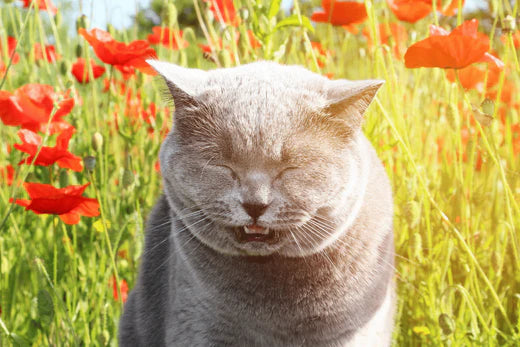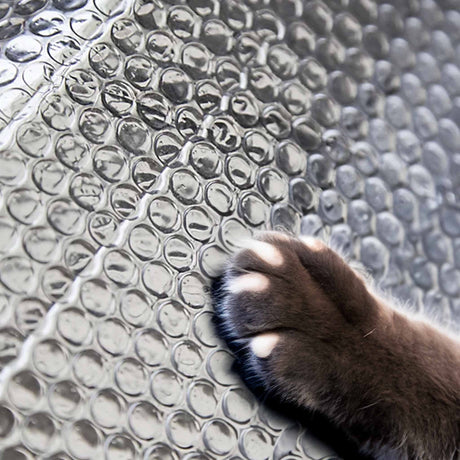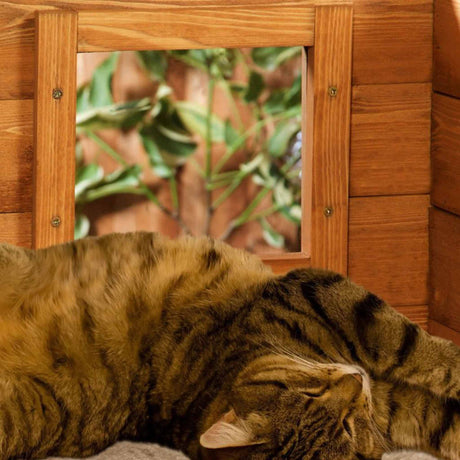It's not just humans that are affected.
Cats do indeed get hay fever, too, often accompanied by those all too familiar symptoms of watery eyes, runny nose, itchy skin and serious bouts of sneezing, wheezing and coughing. For our furry feline friends, however, there are other symptoms too. Unfortunately, this can sometimes make it difficult to diagnose the condition.
In this article, we're looking at everything to do with feline allergies, including the potential causes, symptoms to look out for, how to treat them, and how to prevent allergic reactions in the future.

Carry on reading to find out everything you want, and need to know about your cat and seasonal and environmental allergies.
What Causes Hay Fever In Cats?
There are two types of hay fever, namely seasonal and environmental allergies.
As the name suggests, a seasonal allergy affects cats and people during the spring and summer months between March and August. This is because plants, flowers and even certain grasses release pollen into the air, causing an allergic reaction. Seasonal allergies are also known as pollen allergies.

On the other hand, environmental allergies can be caused by a number of different allergens, including dust, mould, grass, pollen, fungi, cigarette smoke, perfumes or deodorants, and even cleaning products. In addition, indoor and outdoor cats can suffer from this kind of allergy all year round.
What Are The Symptoms Of Hay Fever In Cats?
The most common symptoms of hay fever for cats and people include runny and itchy eyes and sneezing. However, for your pet, hay fever can also affect its skin, resulting in more severe conditions, such as atopic dermatitis.
Other signs your cat may be suffering from hay fever include:
Over grooming or scratching
Overgrooming or excessive scratching is often a sign that your cat has an allergy. Affected areas include the ears, the bottom and skin.
Bald patches, alopecia and sores
As mentioned, it isn't uncommon for a cat with an allergy to overgroom or scratch excessively, resulting in bald patches on the skin. In some cases, a seasonal or environmental allergy can result in hair loss or alopecia. In addition, if left untreated, excessive scratching can lead to sores on your cat's skin.
Paw chewing
A rather unusual symptom of hay fever in cats is sensitive paws. So if you notice your pet has started chewing its feet, it's a good idea to chat with your vet.
Snoring
Snoring in cats is a sign of hay fever. Combined symptoms of an inflamed throat, paw chewing and bald patches of skin are all signs that your cat is suffering from an allergic reaction.
Coughing, wheezing and sneezing
Coughing, wheezing and sneezing are typical signs of hay fever in cats with asthma. However, should your cat start to sneeze, cough or wheeze, and it hasn't been diagnosed, we suggest you speak to your vet as a matter of urgency.

What Treatments Are Available?
Although the symptoms mentioned above are all signs of hay fever, your cat may only display one or two of them, depending on the severity of the allergy. And unfortunately, some of these could be as a result of other underlying health issues, including Feline Immunodeficiency Virus (FIV), Feline Leukemia Virus (FelV), heartworm and an upper respiratory infection (URI).
To correctly diagnose hay fever and rule out any other conditions, we recommend visiting your vet. Once a diagnosis is made, you and your vet can discuss the best treatment moving forward.
Treatments your vet may suggest include:
Corticosteroids
Your vet may suggest corticosteroids to help treat and alleviate your cat's hay fever symptoms. They contain anti-inflammatories, which help prevent or suppress an allergic reaction. Cortisone or steroids, as they are commonly called, are effective, especially when your pet's hay fever symptoms are particularly bad. These are available in tablets, creams or allergy injections.
Antihistamines
While corticosteroids help alleviate hay fever symptoms, antihistamines are administered daily to prevent an allergic reaction.
Other treatments include eye or ear drops, ointments and creams.
Regular baths
Another option to help with your cat's allergies is to give it a bath once a week. While this won't necessarily alleviate all the symptoms, it will ease your pet's itchy skin.
What Preventative Measures Can You Take?
While antihistamines and weekly baths can prevent hay fever, there are other measures you can take to help your cat. If it is seasonal hay fever, we suggest:
- Keeping your cat indoors those days there is a high pollen count
- Dusting and hoovering cat beds and blankets
- Regularly cleaning cat toys
- Daily grooming to remove pollen from its coat
Could The Symptoms Be Caused By Something Else?
Before treating your cat for a pollen allergy, it's essential to rule out any other potential problems. For example, some of the hay fever symptoms, as already mentioned, could also be signs of a more severe illness, a flea infestation or a different type of allergy.
Keen to find out what else your cat may be allergic to? Carry on reading.
Typically, four main allergies can affect cats. These are as follows:
- Seasonal allergies
- Flea allergies
- Environmental allergies
- Food allergies
Because we have already discussed seasonal allergies, this section highlights the other three.
Flea allergies
Flea allergies in cats are incredibly common. Signs of a flea infestation include bald patches or hair loss, itching and inflamed skin. Unlike a pollen allergy, even indoor cats are at risk of a flea allergy.
Environmental allergies
Unlike a seasonal allergy, an environmental allergy or atopic dermatitis will affect cats all year round, whether they spend time outside or are kept indoors. Potential triggers include dust, mould, tobacco smoke, perfume and cleaning products.
Food allergies
Cats can also suffer from food allergies. These allergens are usually found in manufactured cat food and can include dairy, chicken, fish, eggs and beef. In addition, preservatives and artificial flavours or colouring in food can also cause an allergic reaction.
Identifying the cause of your cat's allergic reaction can be somewhat tricky, which can make treating it more difficult. However, your vet will be able to carry out various tests, including a blood test to determine potential allergens and provide you with the correct allergy advice.
Ways To Help Your Cat In And Around The House
If your cat has multiple allergies, there are a few things you can do to help it in and around the home. Take a look at how best to do this.
- Ask your vet to recommend a suitable tick and flea treatment
- Only use cat litter that is free of dust
- Use a medicated shampoo prescribed by your vet
- Don't smoke around your cat
- Change its diet
To Finish Off
Unfortunately, hay fever is something a lot of people, and cats, have to deal with. But there are treatments available that can alleviate the symptoms as well as preventative measures you can take. Because cats can suffer from multiple allergies, we suggest asking your vet for advice before you try and treat your cat with a home remedy.
Before you go, don’t forget to sign up for our weekly newsletter. You’ll receive handy tips and helpful articles about caring for your cat, as well as discounts and member-only rewards.








